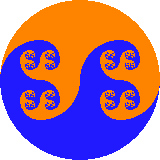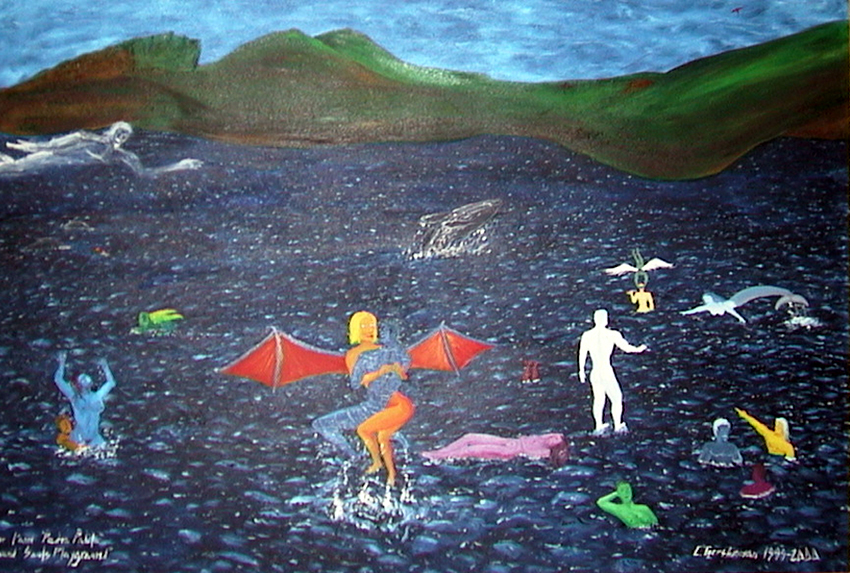
"We can only see a short distance ahead, but we can see plenty there that needs to be done"
--Alan M. Turing

"Found souls playground". Carlos Gershenson, Mexico City, 1999-2000. Oil on canvas, 150 x 100 cm. González Pérez collection.
Through this work we could see, not only that science is understanding how animals behave, preparing the road to understanding cognition; but also that we are able to simulate this adaptive behaviour, building artificial systems with the same properties than the ones present in animal behaviour.
Intelligent behaviour depends on the observer, and also the emergent low-level cognition exhibited by our animats. The animats act as if they would know what they are doing. Do they really know what they are doing? Do we really know what we are doing? If they perform in the same way, the rest is just a matter of interpretation, not important for their actions. The animats behave the way they do, independently of the names we put to the mechanisms that produce their behaviours.
The significance of the Behavioural Columns Architecture lies in its ability to model and simulate adaptive behaviour in such a complete way. The number and quality of the properties presented in BeCA is the highest of all the BPSs and ASMs proposed to date. Also, since it was designed in a bottom-up fashion, more functionality can be added to it in order to improve its performance and capabilities. The fact that it is a context-free BPS, allows it to be implemented in different environments, by designing only the perceptual and motor systems, which are dependent of the environment. Also, the production of behaviours emerging from the interactions among the elemental behaviours, each of which, by itself, is not important in the behaviours production, is noticeable.
Our Imitation and Induction model for social action shows that complex social behaviour might be described, and therefore, undestrood, with very simple rules. That the complexity of the behaviour of the system is determined not only by the complexities of the individuals, but also by the amount of individuals in the system, and the number of their interactions.
Our Behaviours Virtual Laboratory is quite a useful tool. It allowed us to test and validate BeCA and I&I, and now it is available for the community for understanding adaptive and social behaviour, or even just for playing with it. Also, since the source code has been made public for the community, programmers can adapt it and expand it. Students can learn properties of adaptive behaviour, behaviour-based systems, artificial societies, complex systems, object-oriented programming, and virtual reality with our BVL.
The experiments presented allowed us to exhibit the properties of BeCA and the I&I model using our BVL, showing the capabilities of the BVL at the same time.
We are able to create artificial adaptive autonomous agents. This paves the road for creating fully rational and conscious agents.
We believe that social structures of different animal species and different human cultures were evolved following certain rules of the interactions among the individuals with themselves and their environment. These rules would be certainly more complex than the only two in I&I, but we believe that they are similar, and understandable at a short-medium term following a similar approach as the one presented in this work.
With this, we could understand why some animals gather in herds, some are monogamous, others polygamous, societies where only the female raises the siblings (e.g. polar bears), or where they are raised by both male and female (e.g. penguins).
In a similar way, artificial societies and complex systems could help us understand the family structure, the role of the men and women, why some human cultures are monogamous or polygamous, etc.; issues which have a very important role in the development of human cultures and societies and their individuals.
Artificial societies, as the one presented here, have been very important for social sciences. This is because natural societies are very hard to control due to their high complexity, and thus, theories were contrasted with unprecise observations, and sometimes were judged as being mere speculations. Since in a virtual laboratory, one can adjust every parameter, repeat experiments easily, and control the environment and each situation, theories can be contrasted synthetically (Steels, 1995; Verschure, 1998; Castelfranchi, 1998) in order to be validated. Of course, natural societies are not less important, since artificial societies are inspired in them, and created among other things for understanding natural societies.
"Nature likes to hide itself"
--Heraclitus
We are interested in the research of the evolution of cognition. In a similar way that with animal adaptive behaviour, we plan to build artificial systems basing ourselves in ethology, neurophysiology, sociology, philosophy, psychology, and linguistics, not only to understand better cognition, but to build systems with cognitive capabilities in open environments.
The work presented in this thesis is very important for our future plans, because we argue that we need to model and understand first adaptive behaviour in order to attempt to understand cognition and its evolution.
Adaptive behaviour is a behavioural basis of cognition, in the sense that animals evolutionally developed cognition as an extension to adaptive behaviour.
We humans are not that far from other animals (Clark, 1997; Pepperberg, 1991). We are understanding animal behaviour. We are not that far from real artificial intelligence. But the step between adaptive behaviour and cognition is not small. If our brains are not that different from higher animals, our tools are. By tools I mean culture, language, and society. Our brains are not that evolved compared to other animals. We make the world around us smart (Clark, 1997). The structure of our culture, the ability to store information outside us using languages, and the way we interact with each other. We need to address these issues if we want higher cognition to emerge in artificial systems.
"The only impossible thing is something to be impossible"
Biologically, we are not that different from men of six thousand years ago. Why we are so intelligent compared to them? Because of the accumulation of knowledge, provided by language and culture. Education provides the transmission of this knowledge to new generations. If we would isolate a small group of newborns in a closed society, they would not be that different from other primates. If we build a system capable of simulating human cognition, at the beginning the system would not be smarter than a neanderthal. In the same way we educate our children and transmit them our culture, we would need to educate such a system in order to be high-cognitive. This means that "intelligent machines" would need to depart from our culture. Once they would grasp their own culture based on ours, where would their culture go? Wherever we would direct them to lead it. And it seems it would be hard to make a distinction between their culture and our culture.
We believe that reason is based on beliefs. That beliefs are the axioms of reason. Thus, reason cannot be proven (1)... just believed (2). We could say that most of our beliefs are learned by imitation. This implies that, since we cannot be sure of our beliefs, some of them could be collective misbeliefs.
With our experiments, we could see that some misbeliefs were broken by experience. But some did not. It seems that the more experience, the less misbeliefs we will have. But will all our experiences break all our misbeliefs?
"Once you know the rules of the game, you can change them"
How could we be able to understand ourselves, when we use ourselves to understand ourselves? Because we have mirrors. Other people can be these mirrors. Artificial systems can be also these mirrors. But now we can control Artificial Societies, and cannot other people that easily. And once we understand our reflections, we will understand ourselves (3).
At the same time we are understanding human behaviour, intelligence, and mind, we are being able to simulate it. Cognitive science is widening our horizons, questioning many philosophical concepts. If we comprehend how, biologically and/or artificially, we are able to reason, know, imagine, believe; it will definitely shake philosophy from its roots, as it is already beginning to.
As we, on one hand, understand and manipulate nature, and on the other hand, we are able to simulate it; what would be the difference between artificial and natural systems? Only the ones determined by our prejudices.
But once we are able to comprehend cognition, we will be able to simulate it, imitate it, change it, improve it, and create it.
1. This is based on Gödel's incompleteness theorem (See Section 0.2).
2. More completely speaking; reason, beliefs, and experience, are based each one on the others. The exposition of our philosophical system still needs to be made in another work.
3. We can see part of ourselves without reflections. But we need them if we want to understand ourselves more completely.
Carlos Gershenson